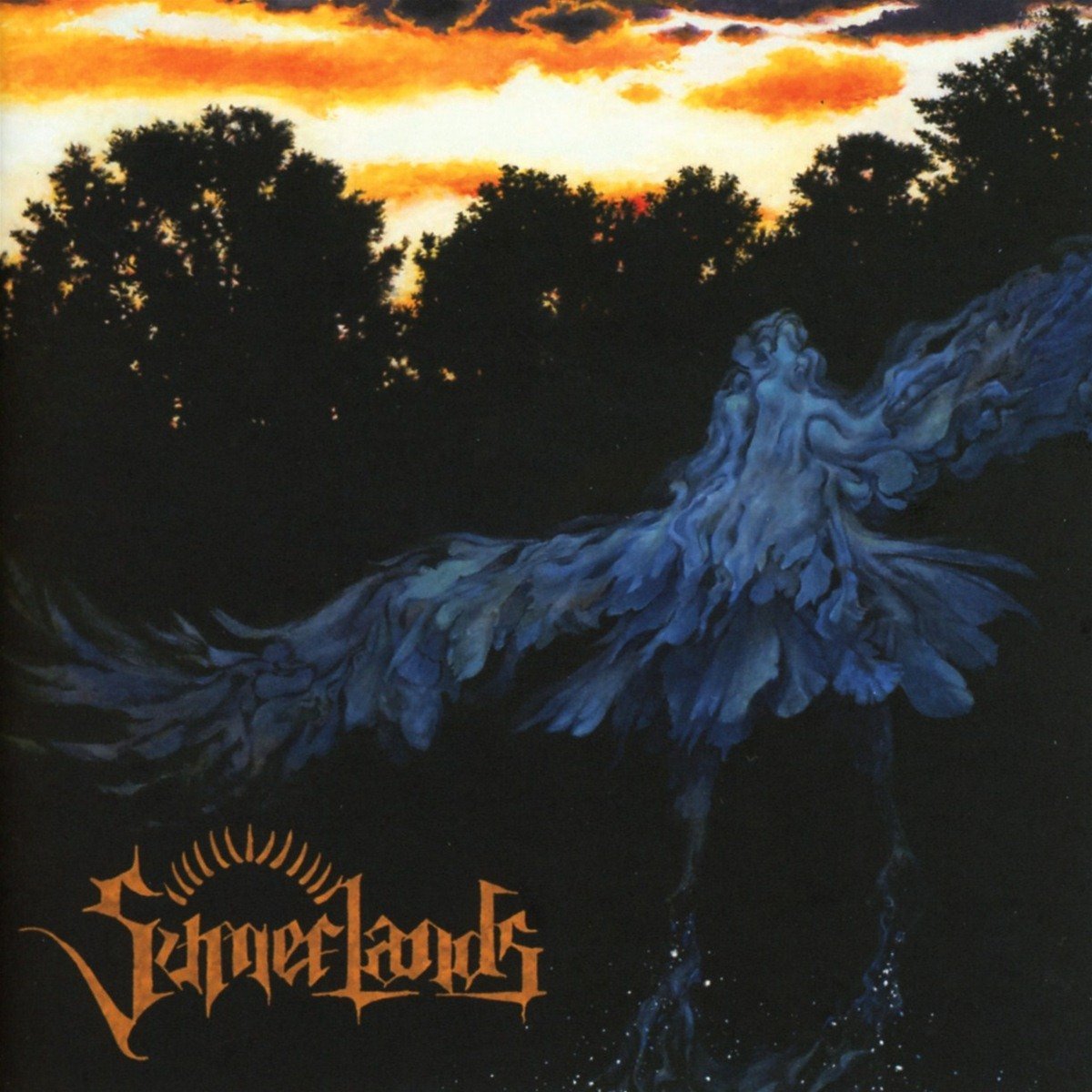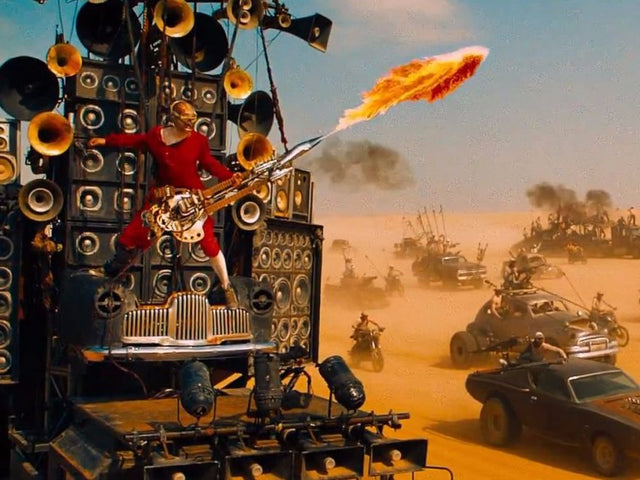The 10 Best Metal Albums of 2016
Our Metal Columnist Raises His Fist To The Best Metal From This Year
Deaf Forever is our monthly metal column.

10. Nails: You Will Never Be One of Us
Do not underestimate Nails. Yes, they have a tendency to flitter their Twitter fingers, and yes, sometimes an ego or two gets bruised in the process. You Will Never Be One of Us, like the rest of their albums, and their presence as a whole, has little eloquence, and even littler need for it. Are they dumb? Hardly. They’ve finally transcended the HM-2 hardcore sound they popularized, and with Todd Jones discovering a knack for hooks, Nails are even more lethal than before. The title track seems divisive on the surface, and subtlety is a futile request for them, but it’s the rallying anthem for not taking the bullshit we need more than ever. “OUR PAIN IS NOT YOUR PAIN, OUR PRIDE IS NOT YOUR PRIDE” sounds like something nice to yell at your local Nazi. “Life Is Death Sentence” takes that anthemic power and channels it through a proclamation that we’re gonna die, but we’re gonna fight first. In “Savage Intolerance” and “Violence is Forever,” Nails have filtered Discharge’s blunt commentary through another layer of blistering noise, all without losing that primal urgency. I noted One of Us’ similarities to Pantera’s Vulgar Display of Power when I first wrote it up, but I’ve noticed a deeper connection: its relentless anger also does not come from masculine fragility, but by inspiring direct strength from within. If you’re trying to look smart by dismissing this as meathead fodder: you’re not. Only thing worse than a tough guy is a fake intellectual.

9. Oathbreaker: Rheia
Is Oathbreaker black metal? Post-hardcore? Shoegaze, or even emo? Oathbreaker is none of those things by incorporating all of those things. Rheia’s fusion is a step ahead for the band, who were once caught between sounding like a Deathwish band of the past and representing Deathwish now, and it shows how black metal as a tool, rather than a ruleset, can make for something really powerful. It begins with Caro Tanghe’s bare voice, a statement of raw intent and an upfront statement that she is Oathbreaker’s key asset. She does not merely lay vocals over the music, but drives it: when she screams, the guitars scream louder, and when she opts for faltering melodies, the band follows suit. Even when the screeching mass they create resembles black metal, there’s an openness that borders on confrontational. At Rheia’s center is “Needles In Your Skin,” where they transform the chug of metalcore into a searing rumination of confusion and loss. When Tanghe keeps crying “How could you go without me” over and over, it speaks to a common wayward feeling, where messy ends never get tied up, where rebuilding is insurmountable. Rheia gives this mental anguish a very real physicality, as it focuses on bodies failing; it’s a sister album to Pharmakon’s Bestial Burden in a way, where the ultimate nightmare is you betraying yourself. Oathbreaker want you to acknowledge that and still realize that giving up isn’t an option, a spit in the face of apathetic acceptance. With that realization, combined with the music, Rheia is something else entirely, maybe not post-genre, but post-convention, post-fear.

8. Palace of Worms: The Ladder
Two and a half decades after Burzum, there’s still beauty in solo black metal, the anguish of the lost soul through buzz and howl. Representing the solitary, but not isolationist, front this year is Palace of Worms, headed by Bay Area black metal musician Balan. In The Ladder, he delves into his goth side, adding a disorienting melancholy to his music. “In the Twilight Divide” begins with damaged jangle-pop before bursting into a black metal assault, and the deary cloak grows tighter on “From the Ash.” It recalls DSBM without being overtly sadboy; the depression is more a sticky veneer than a clobbering aesthetic. “Ephemeral Blues” features some of his most downtrodden and beautiful riffs, a culmination to a record whose direction came from a lack of one. Balan knows that an auteur can’t do it alone, so he calls upon a few locals to complete his vision. Bezaelith, from dulcimer black metal unit Botanist (where Balan is also a member), adds haunting choral vocals to “Divide” and “Nightworld,” giving them oddly gothic metal feels. Balan’s closest contemporary, Steve Peacock of avant-mindfuck Mastery, provides lead guitar work on “From The Ash” and “Strange Constellations,” with his contributions to the latter solidifying the adrift vibe. Sometimes, you want to be alone — a recharge is self care, black metal (when it’s good) is self-care, why not do both?

7. Sumerlands: Sumerlands
What was one innovation eventually becomes a list of standards and practices. Today’s rebellion is tomorrow’s onesie. Such is life, but it’s also tragic when vital music, especially metal, is moving towards the path of inoffensive lounge jazz. 2016 saw an exceptional wave of bands who made traditional metal with a pre-codification sprit, capturing not just the sweetest riffs but the ultimate essence of rocking hard and riding free. Among the cream is Sumerlands, headed up by guitarist Arthur Rizk, already a noted producer who will soon be better known as a riffmaster, thanks to their self-titled debut. His playing combines the hooks of Jake E. Lee and the Viking Rush of Manilla Road, using progressive metal to go beyond celebrating itself. Have you heard anything as encaustic and life-affirming as his bends on “Seventh Seal?” Does his arena soloing on “Haunted Forever” make you believe in Valhalla, where Randy Rhoads never stops shredding? They’re electric moments — repeat after Diamond Head, “IT’S ELECTRIC” — that makes you remember why you got into metal. Phil Swanson, formerly of Hour of 13, is Rizk’s chief partner, bringing an experienced croon that is warm and triumphant simultaneously. He gives off a mythical air, taking on the right meanness for thrashier tracks like “Blind” and “Spiral Infinite,” while giving ballad heart to the weighty “The Guardian.” Rizk is a young warlock, Swanson is an elder veteran, and their chemistry is the heart of Sumerlands: it transcends age, it’s for those who understand the spirit of heavy metal, whether they’re 14 or 40.

6. Wreck and Reference: Indifferent Rivers Romance End
There’s only one song I liked more than Rae Sremmurd’s “Black Beatles” this year: Wreck and Reference’s “Powders.” In a year where collapse was the only constant, it captured not just the inevitability of rot through strife, but the inevitability that we’ll be pissed it’s out of our control. It is a metal song in its beauty and its existential woes — remember, many metal songs praise or lament forces we can’t shape, whether it’s Satan or Big Government — but driven by piano and noise instead of guitar, it does not resemble a metal song. *Indifferent Rivers Romance End *exists on the outer planes of metal, electronic, and industrial, built only from Felix Skinner’s voice and sampler and Ignat Frege’s drumkit. “Powders” set one hell of a precedent, and the rest of Romance is faithful, a clash between Skinner’s taste for rich textures and his own self-panic. He’s come into his own as a songwriter and a performer, blurring the line between Roman glory and shame in “Ascend,” and making “Languish” sounds like Underworld scoring an apocalyptic ending to Trainspotting. Like electronic at its finest, Romance is about how machine will always be influenced by man: Skinner’s electronics are dark but not obtuse, and Frege’s understated drumming ends up being a huge driver. Romance is a metal album, even as it doesn’t sound like any other metal record. Will this be considered whatever’s “metal” in the future? We’ll never evolve out of our anxiety, so maybe.

5. High Spirits: Motivator
Above all else, metal is loud, and that volume encompasses a whole spectrum of emotions. It’s music for parties, funerals, joyrides, tough conversations, and everything else in between. Chris Black, the maestro behind High Spirits, knows this, and channels it through reverence of twin-lead catchiness. Motivator recalls the classic sounds that made metal, with a timeless lust for life. Black sounds bigger than himself, harmonizing vocals and trading off leads as if he’s a full band. A one-man band of the people, no indulgences, just memorable songs. His lean compositions still have room for massive hooks, a case study in the potency of efficiency. This record also reveals Black to be a keen student of Scorpions: he combines the simplicity of the band’s more popular '80s material with their freer spirit in the '70s. His vocals even resemble Klaus Meine, with a somewhat more Australian roughness. Those leads, though? Those are all Thin Lizzy. Black’s been one of metal’s most solid songwriters for some time now, and it’s only with Motivator that he’s found a production style that compliments him. Crisp and clean, his solos sound more jubilant than ever, his voice is even more inspiring, and it sounds huge while remaining close to Earth. He chooses to remain underground, even though he’s got crossover talent too good for the diehards to hoard.

4. Aluk Todolo: Voix
Metal came out of rock music’s increasing appetite for amplification, but in a lot a ways, metal is pretty close to jazz. Both genres hit the sweet spot of technical ability, cerebral energy, and raw heart: a mix of man’s intellectual potential and his inner wilderness. The late '80s and early '90s saw a wave of innovative fusions of jazz and metal, thanks to John Zorn’s avant-grind projects Naked City and Pain Killer, as well as Last Exit, the New York quartet where Sonny Sharrock and Peter Brotzmann brought heavy rock fury to free jazz. A metal group that also feels like listening to a revelatory jazz combo, though? Only French trio Aluk Todolo are on that wave. Voix is a quieter storm compared to its predecessor, Occult Rock, but the turbulence is no less raging. It’s Jack Johnson fighting it out, In A Silent Way. Shantidas Riedacker is the missing link between Sharrock and black metal, fusing both sides’ usage of noise as a melody driver. He’s airy and dense at the same time, conjuring a fog held together by freeform tremolo and expansive feedback. Repetition is important, as it is in black metal; still, Voix draws more on kraut-like basslines driven by Matthieu Canaguier funky hand to arrive at this effect. Aluk Todolo are on the next level of avant-metal, which doesn’t necessarily mean they’re totally outré, thanks to drummer Antoine Hadjioannou. He’s one of the few metal drummers with a head for jazz, working with a frantic feel only Bill Ward in his prime could match. His shuffling causes to Voix fly by, making 45 minutes feel like a grindcore minute. Aluk Todolo feel like they’re just letting go, not looking back, an unusual feeling for metal, not so much for jazz’s more experimental side. New Wave of Jazz Black Metal? NWOJBM isn’t the prettiest acronym, doesn’t mean that Voix isn’t one of the most exciting albums to come from metal’s weirder end in some time. By breaking the sinew of strict composition, metal gets closer to free music, closer to the freedom so often bandied about but rarely put into practice.

3. A Pregnant Light: Rocky
I seek out and write about music that is, most of the time, difficult to listen to. Even I wasn’t prepared for A Pregnant Light’s Rocky, Damian Master’s memorial to his deceased father, Rocky Master. It’s a single 21-minute song, but that’s not where the difficulty lies; Damian will talk your head off about Madonna and Kylie Minogue, and his songs have the pop smarts to back that up. It’s brings you uncomfortably close into his mourning, detailing watching his father die, seeing a pillar of strength take his last breaths. Damian brings that grief into his performance, his blasting black metal filled with longing, his voice more distant and desperate than before. He is crying for a return of a life, not destruction of it, and it’s all the more intense for it. Rocky is filled with rich melodies and gorgeous acoustic interludes, not acting as a balm, rather elevating both Rocky’s stature and Damian’s pain. You rarely see metal that is this personal, something that says, “Here I am, a hurting, grieving person,” without being caked in layers of metaphor. Rocky is fucking direct, it hurts to listen to it — “Thank you for being the greatest man I’ve ever known” is a declaration, no gussying up necessary. It ends with a voicemail from Rocky, devastating to hear still for someone who’s heard the record many times. His final “love you” lives on in recording, as does the pain that there will never be another “love you.” Rocky is a portrait of love, of remembrance, of loss, of sorrow, a celebration of life even through death.

2. Psalm Zero: Stranger to Violence
If you told me at the end of 2015 that someone who used to play in Dirty Projectors would make one of my favorite metal records this year, not only would I have told you to Leave the Hall, there would not be another Hall for you to go to. Leave it to Charlie Looker to make me eat my words. As the bassist and vocalist for Psalm Zero, he’s found fear and ecstasy in all of New York’s '80s: metal, hardcore, and electronic dance, and combined them into a path for metal’s more omnivorous, more potent future. Stranger to Violence’s elevator pitch is “metal New Order,” upping Looker’s melodic gifts that were once in the foreground. Their debut The Drain centered more on former guitarist Andrew Hock’s obsession with Finnish metal and Godflesh’s industrial oppression; its shining moment was when Looker took control with “In the Dead,” a dancey ballad centered around his medieval croon influenced by his love of early music and reverence to Bernard Sumner. Many of Violence’s songs are born from the DNA of “Dead,” chief to Psalm Zero’s astounding growth. Take the title track for example, where Looker delivers this line with subdued glee: “But every day/something needs to die/for me to live/for my fantasy.” It’s metal menace delivered like a new wave hit, chunky guitars acting as Chic gone Ministry. Electronics also play a bigger role here: from the subtle synth strings of the title track, to the bright charge of “Pay Tomorrow,” to the ominous horns of “Not Guilty,” Violence makes debts and gentrification and bloodlust into a throbbing club mix. Say yes to dance, say yes to metal, say yes to Psalm Zero. As much as it’s about the clash of Old and New New York (and “Real Rain” is pretty brutal on this front), it’s a victory for metal looking beyond its own confines.

1. Cobalt: Slow Forever
Narrative is a funny thing. Create a backstory good enough, and that becomes the reason an album’s a future (or instant) classic. Sometimes, you need a story bigger than “we got into a room and made some songs”; a lot of the time, that won’t save your ass. The focus on narrative compels music critics to focus on only a few albums per year, betraying that music is, well, an enormous, multifaceted entity. There wasn’t a uniting metal album this year — Metallica attempted such, but try having a rational conversation about them in 2016. The truth it, metal is many different things now, and that’s not a bad thing. Still, what album should define metal this year?
Slow Forever, Cobalt’s double-disc masterpiece. They certainly had a narrative: expectations were sky-high following their third album Gin, they kicked out their old singer for being a bigot, they get a new singer, then they make their best album ever. Metal’s slowly and (not so) surely coming to grips with abandoning regressive values, and that’s welcome and long overdue progress, but that is only a fraction of why Slow is the best album of 2016.
Erik Wunder had established himself as a black metal talent with Gin; Slow is his awakening as a metal genius. He makes music that is structurally accomplished while gorging on feral urges, which the best metal does, and he did it better than everyone else this year. Wunder is heavily influenced by Tool, mainly Adam Jones and Danny Carey. He wants something rawer than Tool’s metaphysical progressive metal, without losing a philosophical edge, and he returns an animalistic power to the guitars. Gin had that Jones influence too, but Wunder lets those riffs breathe here, because you need that toxic air. If there is a riff that describes “going towards the light before you die,” it’s the break in “Beast Whip” with bright repetition that gives way to intricate sludge. “Elephant Graveyard” and “Final Will” take that concept to hardcore, adding a richness while maintaining immediacy. Slow Forever is about transcending conventions and using genres as bases to a more fulfilling experience rather than as an end; the aforementioned songs are just a small part of what makes this so successful. “Animal Law” takes Neurosis’ tribal drumming and creates a new “Odens Ride Over Nordland,” Bathory’s intro to Blood Fire Death, a prelude that’s far superior to most bands’ actual songs. That’s how good Wunder is. Charlie Fell, Cobalt’s new vocalist, is the perfect fit for the album. He comes from the Mike Williams school of giving voice to decay, especially the decay that sustains. Seeing him live, he’s much more animated than his predecessor, the in the red and only red Phil McSorely, and that’s apparent on Slow. He drags, he begs, he claws, he licks, he takes the punk-metal singer paradigm and adds sensuality. I could go on, but to end 2016, because every narrative has to end somewhere, here’s a Fell line you should use against your adversaries, and as a life motto in general: “Don’t fuck with me/I’ll set you free.”
Andy O’Connor heads SPIN’s monthly metal column, Blast Rites, and also has bylines in Pitchfork, Vice, Decibel, Texas Monthly and Bandcamp Daily, among others. He lives in Austin, Texas.
Join the Club!
Join Now, Starting at $44Exclusive 15% Off for Teachers, Students, Military members, Healthcare professionals & First Responders - Get Verified!







